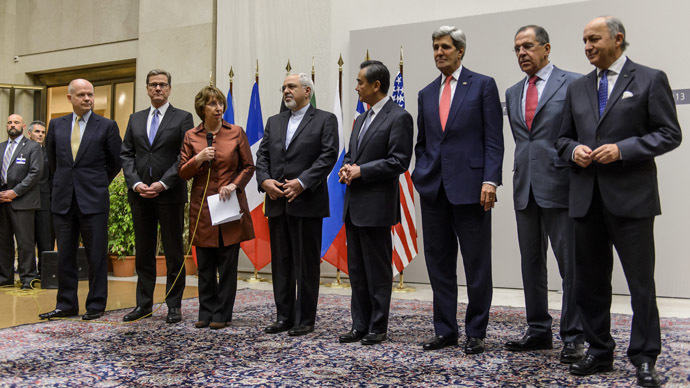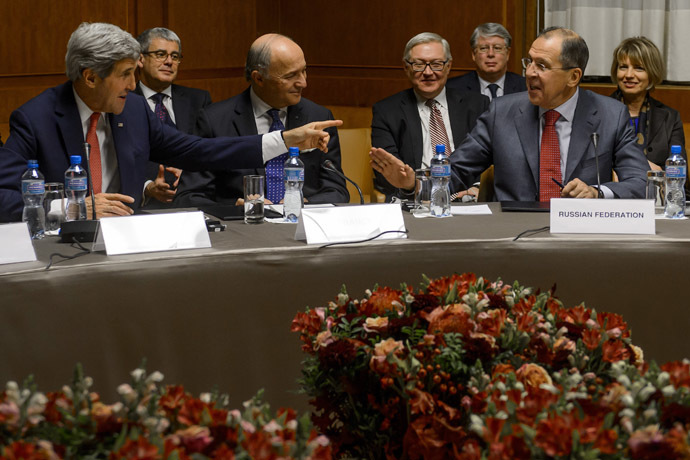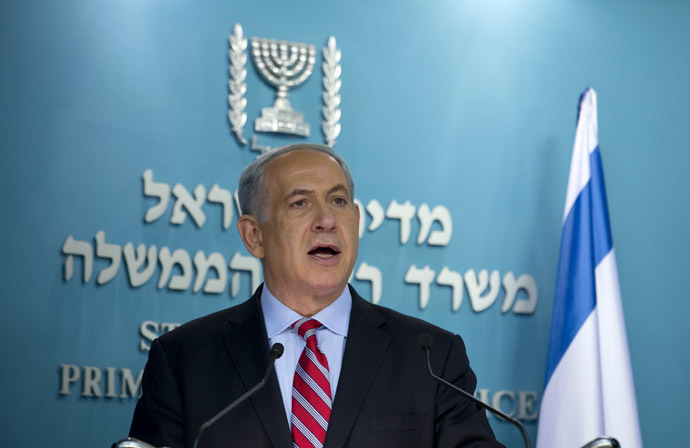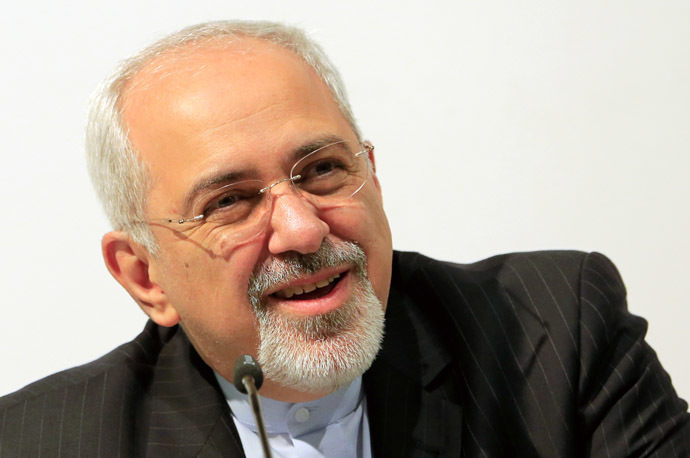Iran & P5+1: Will hardline spin doctors look to derail deal?

The deal on Iran's nuclear program is promising, but differences among the parties threaten the fragile pact. Israel and members of Congress call for more pressure, and Saudi Arabia signals nuclear ambitions in response to changing geopolitical climes.
The agreement clinched in Geneva between Iran and major world
powers is the Obama administration’s most significant diplomatic
achievement, and though ‘all options’ remain on the table
officially, cooler heads in Washington and Tehran have both
understood that even a modest deal is preferable to maintaining
the status quo.
The US and Iran have different interpretations of the agreement
and its impact on the right to enrich uranium in the long term.
Though the current six-month interim agreement technically allows
uranium enrichment to continue at 5 percent, Iranian FM Javad
Zarif believes that a comprehensive deal eventually brokered
after the current pact will fully accept Iran’s uranium
enrichment process within the bounds of international law, while
at the same time lifting all the sanctions that have crippled the
Iranian economy.
On the other hand, Secretary of State John Kerry maintains – with maximum condescension – that
“there will be a negotiation over whether or not they could
have a very limited, completely verifiable, extraordinarily
constrained program, where they might have some medical research
or other things they can do, but there is no inherent right to
enrich.”
The carefully-worded presentation of the pact – delivered by
Obama and Kerry with trademark arrogance – was intended to ease
the concerns of US hawks, Saudi spinsters, and Israeli
belligerents as diplomats unveiled the most significant agreement
between Washington and Tehran since the 1979 Iranian Islamic
Revolution.
After a landmark international debut at the UN General Assembly, Iranian President Hassan Rouhani and FM Zarif have solidified their administration’s diplomatic prowess by successfully hammering out an interim deal, which is – though far from perfect and only modest at best – a reasonably fairer offer extended to Tehran than anything on the table during Ahmadinejad-era nuclear talks.
Rouhani came to power in a landslide victory on the promise that
he would restore Iran’s international standing and resolve the
nuclear standoff, and both the Iranian public and its political
establishment – including Supreme Leader Khamenei and the
majority of parliamentarians – have responded to the deal in a
positive way. Zarif is absolutely right to assert that this deal
is just the beginning; the principle aim of the Rouhani
administration is the full removal of the sanctions, even at the
expense of hyper-intrusive borderline insulting IAEA inspections.

Mother of all red herrings
The Iranian nuclear issue is deliberately framed to Western
audiences in a way that ambiguously suggests an “imminent
breakout,” Iranian intransigence, dishonesty, and ill-intent,
while a simple truth is consistently obfuscated from the
narrative: there is no evidence that suggests the existence of a
military component to Iran’s nuclear program, nor is there any
evidence that Iran’s leadership has plans to develop nuclear
weapons. The basis for the "Iranian threat" is entirely
political.
At no point has the IAEA reported conclusive evidence of a
military dimension to Iran's nuclear program, and in fact, Tehran
has done more than most other countries to address concerns that
its enrichment program may be diverted to non-peaceful uses,
including placing additional restrictions on its enrichment
process by ratifying additional protocols to allow for rigorous
inspection by the IAEA.
Iran's Supreme Leader has consistently declared that the
proliferation of both chemical and nuclear weapons is religiously
prohibited in the Islamic Republic; even while Saddam Hussein's
forces used chemical weapons against Iran in the ’80s, Tehran
never moved to proliferate chemical or nuclear weapons.
For John Kerry to say that the interim deal makes the world safer
implies that Iran posed some short of existential threat, which
both evidence and objective logic do not support, especially when
Israel – an openly-racist, openly-unlawful, hyper-militarized
European settler-colony – maintains undeclared arsenals of
chemical weapons and nuclear warheads outside the purview of any
international treaty or monitoring organization.
The paradoxical double standards imposed on Iran in the face of
Israel’s blank check to commit war crimes and break international
law is utterly stupefying. Despite facing absurd hypocrisy,
Tehran has maintained ‘heroic flexibility’ in agreeing to the
interim deal, which would unfreeze $6 billion to $7 billion in
sanctions relief; modestly relieving restrictions on the
country's trade in gold, petrochemicals, car and plane parts;
allow purchases of Iranian oil at their current levels; allow the
government to transfer tuition assistance funds to Iranian
students in third countries; additionally, no new nuclear-related
sanctions are to be imposed during the six-month window.
In exchange, Iran must halt enrichment above 5 percent and
dismantle technical connections required to enrich above that
amount; it must not install additional centrifuges of any type
and must not construct additional enrichment facilities; it must
not commission or fuel for the Arak reactor and it must allow
IAEA inspectors daily access to nearly every aspect of the
nuclear program.

Meanwhile, in Israel
Tel Aviv has Iran accused of being "months away from the bomb"
for over two decades, and Israeli PM Netanyahu uses every
opportunity to lambast Tehran in international speeches, often
relying exclusively on dubious or highly debatable claims to
delegitimize Iran’s nuclear program. Netanyahu has unsurprisingly
rejected the interim deal with Iran, calling it a “historic
mistake” and laying on the hyper-theatrics.
Even from a hypothetical Israeli standpoint, one could argue that
any threat Iran could have once posed is now significantly
neutralized due to strict monitoring that Tehran has agreed to.
Iran isn’t enriching uranium anywhere near the 90 percent needed
to make a bomb, and so the persistent defiance of Netanyahu has
become a visible annoyance to the Obama administration, and even
British Foreign Secretary William Hague has told him off.
Much of the US Congress and the Israeli lobby are very unhappy
about this deal, and are preparing increased economic penalties to
impose on Tehran if any part of the deal is breached. The cool
heads in Washington that were responsible for clinching this
agreement should keep hardline elements in check. The biggest
concern for Iran is that the other side will falter, thereby
unraveling all the diplomatic acrobatics needed to cut a deal in
the first place, thus creating a climate of total distrust.
In an interview with NBC news, FM Zarif made his position crystal clear, “If there are new sanctions, then there is no deal. It’s very clear. End of the deal. Because of the inability of one party to maintain their side of the bargain.”
The current Iranian government is bent on cooperating and ending
the economic deadlock imposed on their country. Any perceived
breach of the agreement by the Iranians – which would likely be
only a marginal or accidental technicality – could instantly
become politicized and used by opponents to argue for more
pressure to collapse the fragile peace.

Nuclear Wahhabis?
A recent report published by the BBC citing
intelligence sources suggests that Saudi Arabia may be looking to
acquire nuclear weapons from Pakistan after years of substantial
financial assistance to Pakistan’s defense sector. The timing of
these reports, released just prior to the Iran talks, are curious
given that most of the intelligence sources originate from
Israel, which suggests that this information could have been
intended to pressure world powers into taking a zero-tolerance
stance on Iran’s nuclear program.
The chairman of Riyadh’s Foreign Affairs Committee, Abdullah
al-Askar, was recently quoted expressing alarm over the
changing geopolitical currents of the region.
“I am afraid Iran will give up something on to get something
else from the big powers in terms of regional politics. And I'm
worrying about giving Iran more space or a freer hand in the
region,” he said, before openly calling for Saudi Arabia to
acquire nuclear weapons if the Iranians were not prevented from
building a bomb.
The Lebanese al-Manar channel has also reported that during Kerry’s recent trip
to Riyadh, he called on Saudi officials to dismiss Intelligence
Chief Prince Bandar Bin Sultan from his post over the Obama
administration’s deep unhappiness with Saudi tactics used on the
ground in Syria.
The US-Saudi rift has been growing by the day following Prince
Bandar’s calls for Riyadh to distance itself from the US after
the Obama administration agreed to the Russian chemical weapon
disarmament plan and reneged on striking Syria. If these
intelligence sources are correct, it’s possible that the Saudis
may acquire nuclear weapons as a response to a historic thaw in
US-Iran relations.
Washington’s response to these developments will make or break Saudi-US relations. Much like Israel, the Saudis have been given a trump card to break international law and commit deplorable human rights violations.
The real ‘historic mistake’ would be for the Obama administration to continue turning the other cheek on Tel Aviv’s nuclear program and Riyadh’s bombastic aspirations, while leaving President Rouhani’s call for a nuclear-free Middle East out in the cold.
The statements, views and opinions expressed in this column are solely those of the author and do not necessarily represent those of RT.
The statements, views and opinions expressed in this column are solely those of the author and do not necessarily represent those of RT.













